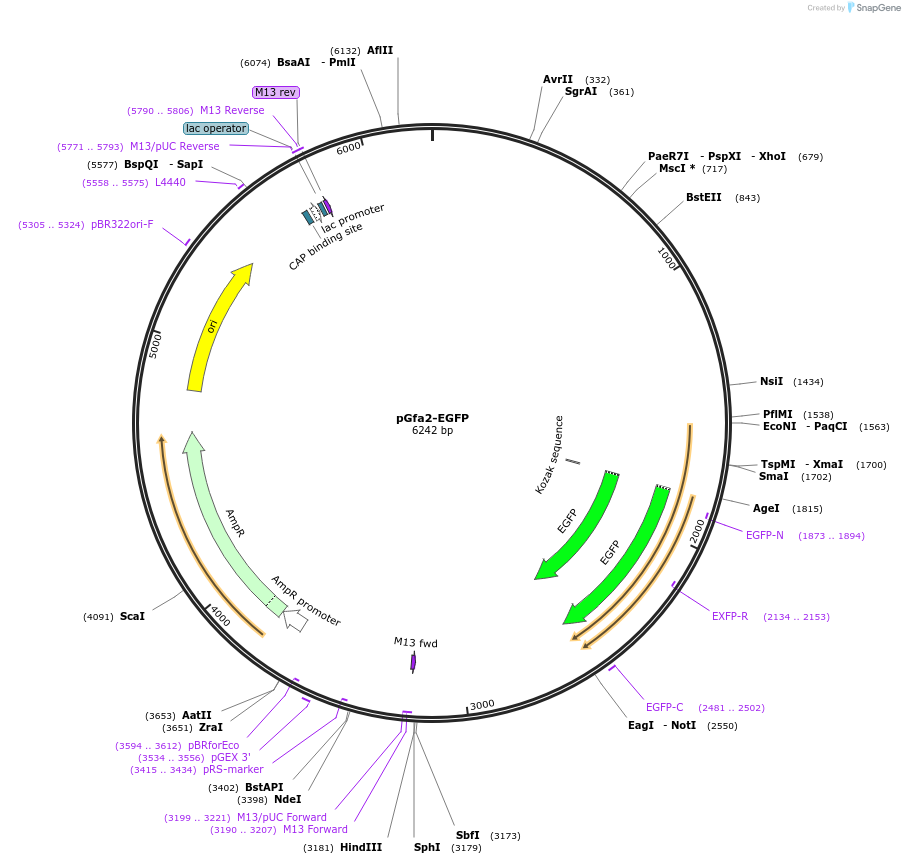-
PurposeExpression of EGFP in mouse astrocytes
-
Depositing Lab
-
Publication
-
Sequence Information
Ordering
| Item | Catalog # | Description | Quantity | Price (USD) | |
|---|---|---|---|---|---|
| Plasmid | 53128 | Standard format: Plasmid sent in bacteria as agar stab | 1 | $89 | |
Backbone
-
Vector backbonepGfa2-cLac
-
Backbone manufacturerBrenner Lab
-
Vector typeMammalian Expression, Mouse Targeting
Growth in Bacteria
-
Bacterial Resistance(s)Ampicillin, 100 μg/mL
-
Growth Temperature37°C
-
Growth Strain(s)DH5alpha
-
Copy numberUnknown
Gene/Insert
-
Gene/Insert nameGfa2
-
Alt nameglial fibrillary acidic protein
-
Alt nameGFAP
-
SpeciesH. sapiens (human)
-
Mutationcontains -2163 to +47 (the human gfa2 segment), with the initiating ATG mutated to TTG
-
Entrez GeneGFAP (a.k.a. ALXDRD)
- Promoter human Gfa2
-
Tags
/ Fusion Proteins
- EGFP (C terminal on insert)
- mP1 (C terminal on insert)
Cloning Information
- Cloning method Restriction Enzyme
- 5′ cloning site BglII (not destroyed)
- 3′ cloning site BglII (not destroyed)
- 5′ sequencing primer MB-351 CATCGCCAGTCTAGCCCACTCCT
- 3′ sequencing primer MB-352 GACGTTGTAAAACGACGGCCAGT
- (Common Sequencing Primers)
Resource Information
-
Supplemental Documents
Terms and Licenses
-
Academic/Nonprofit Terms
-
Industry Terms
- Not Available to Industry
Trademarks:
- Zeocin® is an InvivoGen trademark.
Depositor Comments
This plasmid was made by digesting pGfa2-cLac with BamHI to remove the lacZ gene (digestion of pGfa2-nLac would produce the same recipient), blunt ending by filling in, and inserting the SmaI/StuI fragment from Clontech's pEGFP that contains the EGFP coding region. The first two bases from each of the filled in BamHI sites were lost during the construction.
These plasmids were created by your colleagues. Please acknowledge the Principal Investigator, cite the article in which the plasmids were described, and include Addgene in the Materials and Methods of your future publications.
-
For your Materials & Methods section:
pGfa2-EGFP was a gift from Michael Brenner (Addgene plasmid # 53128 ; http://n2t.net/addgene:53128 ; RRID:Addgene_53128)



